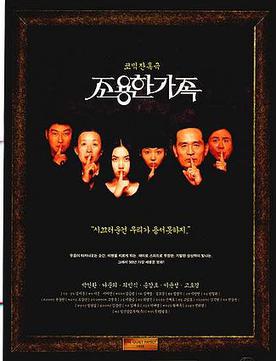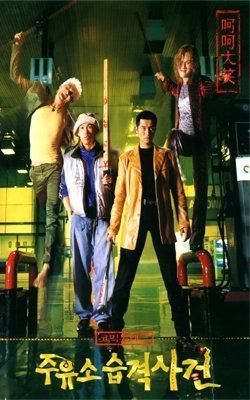It’s sort of like ‘Speed’ but in South Korea and on a
motorcycle. It’s a comedy-action film that’s pretty entertaining all things
considered, though it might be a little too long, a little too unfocused and a
little tonally inconsistent. The movie mostly overcomes its shortcomings and
offers a silly take on motorcycle action flicks.
Ki-su, the former leader of a motorcycle gang, is now down
on his luck working as a bike courier in Seoul. He is given a job driving the
lead singer of a popular pop-band to a concert she’s performing at, only to
discover that it’s Chun-sim, the girl he unceremoniously dumped during his
gang-leader phase. She puts on his helmet, only to trigger a time limit - a
terrorist bomber has rigged the helmet with explosives, forcing Ki-su and
Chun-sim to deliver three packages across town. There are rules – they have a
strict time limit of thirty minutes to make each delivery or the bomb will go
off. Ki-su’s wristwatch also cannot be more than ten metres away from
Chun-sim’s helmet or it’ll explode. If they try and remove either, it will
explode. Forced together the two need to race against time to deliver the
packages while avoiding explosions, the police and angry gangsters, while the
police force try and track down the bomber.
There is some action, some thrills, some stunts and a lot
more comedy than you’d probably expect. There are also a lot of explosions.
Maybe more than you’d expect (it gets to the point where everything seems like
it explodes), and almost every single one of them is used to show characters
making ridiculously silly faces. The film is more a comedy than anything else.
Instead of the high-stakes action-thriller trappings of Speed, Quick goes for
silly slapstick and ridiculous hijinks. It’s comedy-action more than
action-comedy. That’s not to say it’s devoid of action – there are a few chases
thrown in, but more time is spent off of the motorcycle than on it and a lot
more character interplay and comedy is thrown in together.
There are some odd tonal shifts. Every scene actually
involving the villainous bomber is serious and would fit in a proper thriller.
Actually the underlying background plot is pretty much serious business against
the comedy silliness of most of the rest of the film. It’s also a bit too long.
The finale continues a lot longer than you’d imagine as they throw in some
flashbacks to explain and link just about everything together. There are also
several threats to overcome all thrown onto each other – at least twice you
feel as though the final conflict has been dealt with.
There are some motorcycle stunts, which will seem pretty slow
and basic to those who watch a lot of car chase movies, but over the end
credits they show the stunt footage which astoundingly shows that pretty much
every single stunt went wrong, resulting in a lot of people getting hurt. One
stunt woman in particular gets burnt, cut and bruised constantly. The reel at
the end is pretty sobering as it shows people getting taken to hospital,
getting cut and burnt and hurt in general. What is more concerning is the looks
of genuine horror and worry on the faces of the spectating cast and crew when
something goes wrong, some who are even on the verge of tears. The bigger motorcycle
stunts and explosions are all done with CGI, and it mostly looks fine. Barring one or two
dodgy instances of CGI (CGI glass looks insanely fake), it mostly works well.
A big aspect of the movie is watching Ki-su and Chun-sim
making silly faces as they ride off buildings, away from explosions and through
traffic. The two have an odd sort of wacky chemistry – while the film does try
to do the whole ‘rekindling the romance’ thing, the two click better when
they’re just involved in random hijinks. Without the comedy aspect, Ki-su would
make a dull lead – they do try for some drama with both characters, but it
doesn’t quite work. For a movie titled ‘Quick’ it certainly takes its time
getting around. It’s not exactly slow, with the movie running at a pretty brisk
pace over its 110 minute length, but at some points the movie seems to get side-tracked
and the desperate race-against-time never feels that important.
One point of odd interest – as the audience we’re meant to
be rooting for Ki-Su and Chun-sim to make the deliveries on time, but every
time they deliver one of the packages a bunch of people get blown up and
killed. So while the heroes go through some action stunts and silly hijinks,
every time they’re successful some people get killed. The movie sort of tries
to distract you from this, with most of the victims being gangsters or corrupt
businessmen, but it’s still pretty grim when your comedy-action movie
periodically has the heroes basically bomb a few buildings full of people. In the end Quick is pretty entertaining. It's not the best movie ever but it is a fun time.





















.jpg)




















